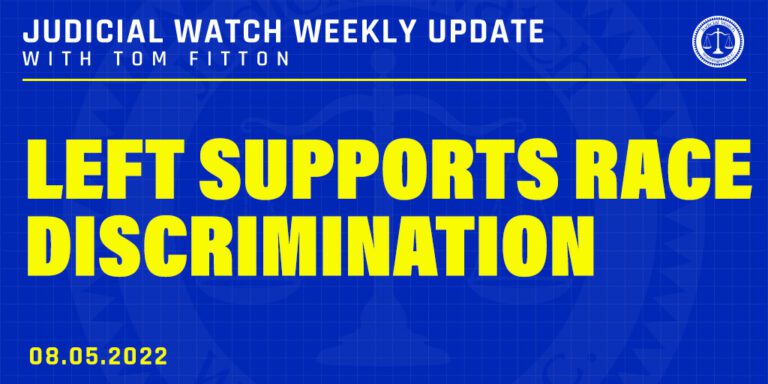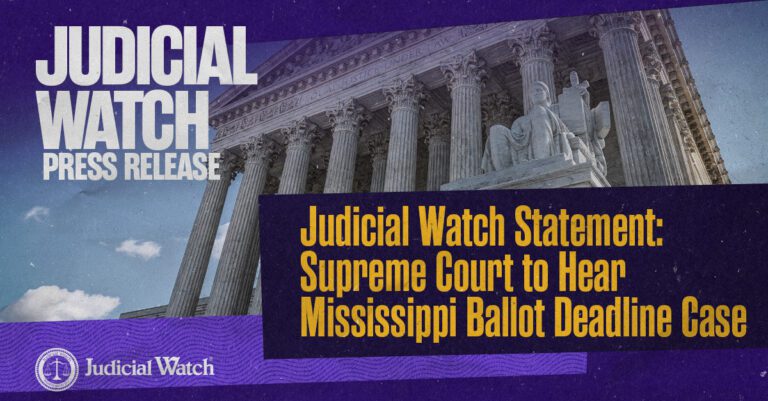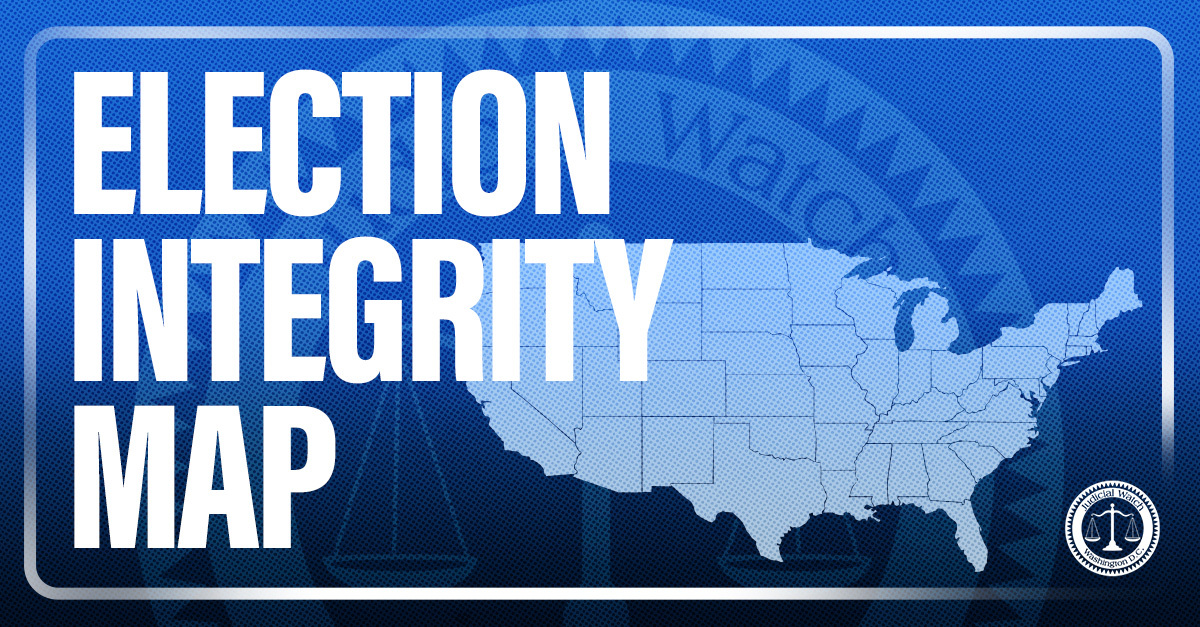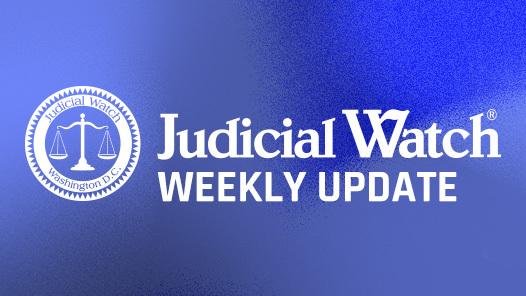
Left SUPPORTS Race Discrimination

SUPREME COURT UPDATE: Judicial Watch, Allied Educational Foundation Challenge Harvard, UNC Race-Based Admissions Policies
Judicial Watch, AEF Challenge Fairfax County School Race-Based Admissions
Obama “Diaper Disparity” Plan Gets $8 Million Despite Congressional Opposition
SUPREME COURT UPDATE: Judicial Watch, Allied Educational Foundation Challenge Harvard, UNC Race-Based Admissions Policies
In a perversion of the Constitution, our colleges and universities, along with our federal government, think nothing of discriminating on the basis of race. We’re bucking the tide.
We filed amici curiae briefs alongside the Allied Educational Foundation (AEF) in support of Students for Fair Admissions’ Supreme Court cases challenging both Harvard College and the University of North Carolina’s (UNC) race-based affirmative action admissions programs (Students for Fair Admission v. President & Fellows of Harvard College (No. 20-1199)) and (Students for Fair Admissions, Inc. v. University of North Carolina, et al. (No. 21-707)).
Students for Fair Admissions argues that both Harvard and UNC’s use of race in their undergraduate admissions process violates the Equal Protection Clause of the Fourteenth Amendment to the United States Constitution and Title VI of the Civil Rights Act of 1964. The Constitution’s Equal Protection Clause commands that:
No State shall make or enforce any law which shall abridge the privileges or immunities of citizens of the United States; nor shall any State deprive any person of life, liberty, or property, without due process of law; nor deny to any person within its jurisdiction the equal protection of the laws.
We and AEF argue that the Court should reject a prior 1978 Supreme Court opinion that seemingly authorizes racial discrimination in college admissions (Regents of Univ. of Cal. V. Bakke, 438 U.S. 265 (1978)). Since Bakke, there have been “at least 26 separate opinions. Many of these have attempted to explain the constitutional rationale for allowing race-based preferences, even though those rationales appear to directly conflict with the original meaning and text of the Equal Protection Clause.”
We highlight how race-based discrimination (and the resulting quota mentality) is permeating government. The brief quotes Vice President Kamala Harris’s attack on equality and implicit call for race-based quotas:
There’s a big difference between equity and equality. Equality suggests, “everyone should get the same amount.” The problem with that, not everybody’s starting out from the same place…. Equitable treatment means we all end up in the same place.
Referencing this and other Biden administration actions promoting racial favoritism, we note:
There is, however, no constitutional guarantee that we will all “end up in the same place.” The foregoing statements reveal a distorted view of the Equal Protection Clause that would guarantee racially proportionate outcomes under the name of equity, not the equality of opportunity the Equal Protection Clause has always guaranteed. These are more than mere words or theories. Racial preferences have increasingly become incorporated in real-world, governmental decisions and policies. For example, United States Department of Agriculture (USDA) officials recently sought to use race as a basis for deciding who receives governmental loan forgiveness.
Our higher education system needs to start following the Constitution and stop its race discrimination. The Supreme Court would strike an historic blow for equal protection by putting a stop to this creeping racism.
(For the record, Judicial Watch has become the preeminent voice for civil rights and the law, as properly understood under the US Constitution.
We and AEF recently filed an amici curiae in support of the Coalition for Thomas Jefferson High School’s challenge to race-based admissions policies for the nationally known public high school that were put in place at in Fairfax County, Virginia.
In May 2022, we won a court battle against California’s gender quota law for corporate boards. The verdict came after a 28-day trial (Robin Crest et al. v. Alex Padilla (Case No. 19STCV27561)). The verdict followed a similar ruling in our favor in April finding California’s diversity mandate for corporate boards unconstitutional.
In January 2022, the city of Asheville, NC, settled our federal civil rights lawsuit after agreeing to remove all racially discriminatory provisions in a city-funded scholarship program. Additionally, the city also agreed to remove racially discriminatory eligibility provisions in a related program that provides grants to educators. The City Council approved the settlement on January 11.
In April 2021, we and AEF filed an amici curiae brief in support of Students for Fair Admissions’ (SFA) petition for awrit of certiorari to the U.S. Supreme Court, challenging a decision of the U.S. Court of Appeals for the First Circuit upholding Harvard College’s race-based affirmative action admissions program (Students for Fair Admission v. President & Fellows of Harvard College (No. 20-1199)).
In March 2021, we filed an amici curiae brief with AEF in a companion case, in support of SFA’s petition for a writ of certiorari to the Supreme Court challenging a decision of the Court of Appeals for the Fourth Circuit, which upheld the race-based admissions program at the University of North Carolina (UNC) (Students for Fair Admissions, Inc. v. University of North Carolina, et al. (No. 21-707)). The amici brief asked the court to no longer allow “universities to defend race-based admissions programs by relying upon schools’ purported educational needs for increased diversity.”
In January 2022, the Supreme Court agreed to review both decisions.
The Allied Educational Foundation is a charitable and educational foundation dedicated to improving the quality of life through education. In furtherance of that goal, the Foundation has engaged in a number of projects, which include educational and health conferences domestically and abroad. AEF has partnered frequently with Judicial Watch to fight government and judicial corruption and to promote a return to ethics and morality in the nation’s public life.
Judicial Watch, AEF Challenge Fairfax County School Race-Based Admissions
A public school system in Virginia is determined to admit certain students, Black and Hispanic, on the basis of their race and deny others, Asian Americans, for the same reason. Again, this is flagrantly unconstitutional.
We filed an amici curiae (friend of the court) brief along with the Allied Educational Foundation (AEF) opposing the race-based admissions for nationally-known public high school in Fairfax County. Our brief supports the Coalition for Thomas Jefferson High School in its challenge to the policy (Coalition for TJ v. Fairfax County School Board et al. (No. 22-1280)).
We ask the United States Court of Appeals for the Fourth Circuit to affirm a lower court decision finding that Fairfax County Public Schools’ (FCPS) race-based admissions policy is unconstitutional because of its improper considerations of race.
We argue that the trial court cited ample evidence showing that the race-based admissions policies were developed with invidious discriminatory intent:
As the court recounted, less than two weeks following the death of George Floyd, TJ’s principal Ann Bonitatibus emailed the entire TJ community proclaiming that the demographics of TJ “do not reflect the racial composition in FCPS [Fairfax County Public Schools].” … The next day an FCPS Board member emailed a local legislature, describing her “anger and disappointment” regarding underrepresentation of Black and Hispanic students and predicting there would be “intentional action forthcoming” from FCPS … The record showed that Board members admonished Superintendent Braband that any forthcoming policy change needed to be “explicit in how we are going to address the under-representation of Black and Hispanic students.” … Later, at a public meeting, another Board member explained that “in looking at what has happened to George Floyd,” FCPS must now “recognize the unacceptable low numbers of African Americans that have been accepted by TJ.”
We further argue that Fairfax County Public Schools violated the Equal Protections clause by attempting to add their preferred races to schools instead of created an honest balance:
But the truth is that FCPS [Fairfax County Public Schools] was not interested in improving TJ’s diversity – TJ’s student body was already diverse. Rather, FCPS sought to change the racial mix by increasing the representation of underrepresented, preferred minorities (Blacks and Hispanics) to the disadvantage of other minorities (Asian Americans). To that end, an FCPS Board member declared that it “need[ed] to be explicit in how [it was] going to address the under-representation of Black and Hispanic students.”
We also argue:
[Fairfax County Public Schools] makes the incredible claim that it enacted the new policy without knowing the effect it would have on TJ’s student admissions and, as a result, there can be no discriminatory intent. It is quite remarkable that FCPS contends it adopted a new admissions policy for the country’s top public high school without any understanding as to the impact it would have on students. This claim is even more incredible considering that the policy change was prompted by the Board’s response to the civil upheaval following George Floyd’s murder and after intense pressure by state officials to improve the racial balance of TJ’s admissions. It is certainly a far cry from the “explicit” response promised by FCPS Board members.
***
FCPS cannot contend both that it was ignorant as to the effects of the policy and that it knowingly enacted the policy “in spite of” the impact it would have on Asian American applicants. Moreover … here there was evidence in the record that the policy was enacted “because it would accomplish the collateral goal of” reducing Asian American representation in TJ’s admissions.
Obama ‘Diaper Disparity’ Plan Gets $8 Million Despite Congressional Opposition
The “nanny state” is now literal. Your tax dollars will be spent to combat “diaper disparity” and close a national “diaper divide.” This, despite the fact that the Congress has consistently opposed this giveaway, as our Corruption Chroniclesblog reports.
Though Congress has repeatedly denied laws to give needy families government-subsidized diapers—in addition to free medical care and food—the Biden administration is quietly allocating millions of dollars to the cause originally funded by the Obama administration to end a pandemic of “diaper disparity.” A Health and Human Services (HHS) division known as Administration for Children and Families (ACF) Office of Community Services (OCS) is doling out $8 million to provide diapers and diapering supplies through government distribution programs for families with low incomes. The program is officially known as Diaper Distribution Demonstration and Research Pilot (DDDRP) and it aims to provide diapers on a consistent basis. “One in three families in the U.S. with diaper-age children report having unmet diaper need,” according to the grant announcement. “Diaper need is largely defined as the lack of a sufficient supply of diapers to keep an infant/toddler clean, dry, and healthy. Infrequent diaper changes can lead to diaper rashes and urinary tract infections, compromising the health and well-being of infants and toddlers.”
The lengthy document cites random studies on the impacts of diaper need, which of course, “disproportionately impacts families with low incomes and can have long-term, multigenerational effects,” according to the government. Besides the detrimental health effects on the infant, the studies referenced by HHS found associations between diaper need and parental stress, which can have negative, compounding effects on the health and well-being of both caregivers and children. As an example, the agency writes that childcare providers require an adequate supply of diapers yet many low-income families cannot afford a consistent supply. “Therefore, diaper need can prevent infants and toddlers from being in early care settings, and further exacerbate the impact of poverty by impeding caregivers’ ability to attend school, training programs, and/or work consistently,” according to the health agency. Another study used by HHS to make its case found that more than half of parents who rely on childcare have missed work because of an inadequate supply of diapers, which means “access to diapers represents both a public health concern for the well-being of children and a source of economic stress for parents and caretakers.”
The goal of the $8 million DDDRP is to maximize diaper distribution programs so low-income and “diverse” families can receive taxpayer-funded diapers on a consistent basis. This will solve many problems, according to HHS. For instance, the agency claims the great American diaper giveaway will lower anxiety and depression among parents, decrease rates of missed days for children in childcare, reduce family health issues by improving the health of caretakers and children, increase workforce participation and reduce economic stress by cutting unemployment. “Other programs providing social supports to low-income families provide targeted benefits for food assistance, housing, healthcare, etc., but none of them provide funding for diapers or diapering supplies,” the HHS document states, adding that “ongoing diaper support” improves economic stability, reduces familial stress, and increases parental self-sufficiency.
The push for government subsidized diapers has been met with powerful congressional resistance for years. Back in 2016, after Congress twice rejected laws to give needy families free diapers, President Obama allocated $10 million in taxpayer money to the cause. At the time the White House promoted the initiative as essential to eradicate a national “diaper divide” and the stated goal was to abolish “diaper disparity” by expanding access for American’s poorest families. Obama’s White House Domestic Policy Director, Cecilia Muñoz, spearheaded the initiative, asserting diapers are imperative to babies’ health and “no family should have to choose between keeping their babies healthy and keeping the lights or heat on.” Months earlier Congress resoundingly rejected the second measure (Hygiene Assistance for Families of Infants and Toddlers Act) in four years to grant poor familiesgovernment-subsidized diapers. Years earlier similar legislation (Diaper Investment and Aid to Promote Economic Recovery Act) also got slammed in Congress.
More recently legislation to provide free diapers has also failed to advance in Congress. The latest, End Diaper Need Act of 2021, has stalled in both the House and Senate since early last year. The measure aims to appropriate $200 million annually to provide diapers and diapering supplies for low-income families.
Until next week …

















